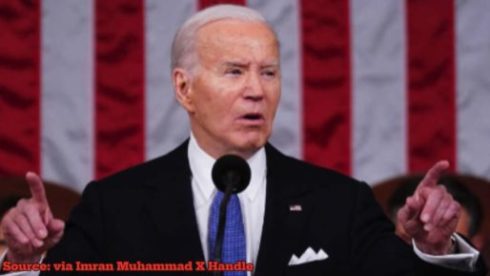U.S. President Joe Biden is gearing up to introduce a significant overhaul of the Supreme Court, which includes imposing term limits for justices and establishing an enforceable ethics code. The proposal, reported by the Washington Post, signals a shift in Biden’s stance on judicial reform, an issue he has previously approached with caution. Sources familiar with the plan revealed that Biden aims to address longstanding concerns about the Supreme Court’s impartiality and accountability.
During a call with the Congressional Progressive Caucus on Saturday, Biden hinted at upcoming reforms but refrained from detailing his plans. This proposal marks a significant departure from his earlier reluctance to endorse changes such as term limits or expanding the court, which many Democrats have advocated following the appointment of three conservative justices by former President Donald Trump.
Biden Considering Ending Broad Presidential Immunity
In addition to Supreme Court reforms, Biden is also contemplating a constitutional amendment to end broad presidential immunity. This potential amendment would aim to hold presidents accountable for their actions while in office, addressing criticisms that current laws shield them from prosecution and civil suits. The proposed changes reflect a growing demand for increased transparency and accountability within the executive branch.
The notion of curbing presidential immunity has gained traction among legal experts and lawmakers who argue that it is essential for maintaining the rule of law. Biden’s consideration of such a constitutional amendment underscores his commitment to ensuring that no individual, regardless of their position, is above the law.
The Road Ahead: Challenges and Support
Implementing these sweeping changes will require significant Congressional support and possibly a constitutional amendment, both of which present formidable challenges. Biden’s proposal for Supreme Court term limits has garnered bipartisan support among legal experts, who believe that 18-year term limits could reduce partisanship and enhance the judiciary’s credibility. This support was echoed in an October report by a bipartisan group of legal scholars.
However, the path to reform is fraught with political hurdles. Biden’s plans are likely to face strong opposition from Republicans and possibly some moderate Democrats. Despite these challenges, the President’s willingness to tackle such contentious issues reflects his determination to address systemic problems within the American judicial and executive branches. As Biden and Trump prepare for a rematch in the November 5 election, these proposed reforms could become a pivotal issue in the campaign, highlighting contrasting visions for the future of U.S. governance.
Response to Democratic Outrage
The consideration of these proposals is a response to increasing outrage among Democrats over recent Supreme Court decisions. These include overturning landmark rulings on abortion rights and federal regulatory powers that had stood for decades. The ethics of the court have also been questioned, particularly after revelations that Justice Clarence Thomas accepted luxury trips from a GOP mega-donor. Biden, in a recent interview with BET, predicted that there might be two more appointments to the Supreme Court in the next four years and blamed Trump for nominating three conservative justices who contributed to overturning Roe v. Wade.
Speaking in a weekend call with the Congressional Progressive Caucus, Biden discussed the possibility of these reforms. He emphasized the need for more Democrats in Congress and a Democrat in the White House to counteract the conservative-leaning court. According to a transcript of the call, Biden stated, “I’ve been working with constitutional scholars for the last three months, and I need some help.” A 2022 poll from the Associated Press-NORC Center for Public Affairs Research showed that about two-thirds of Americans favor term limits or a mandatory retirement age for Supreme Court justices.
Public and Political Reactions
Confidence in the Supreme Court remains low, with a June survey indicating that 4 in 10 U.S. adults have hardly any confidence in the people running the court. The survey also found that 7 in 10 Americans believe the justices are more influenced by ideology than by a fair and impartial interpretation of the law. In November, the court adopted its first code of ethics, which, despite being agreed upon by all nine justices, does not impose significant new requirements and leaves compliance to each justice’s discretion.
Republicans have long focused on reshaping the federal judiciary and Supreme Court. When Mitch McConnell was Senate Majority Leader, he blocked President Obama’s 2016 Supreme Court nominee, Merrick Garland, paving the way for Trump to nominate three justices. This strategic move has significantly influenced the judiciary’s composition for a generation. Democrats are now recognizing the importance of judicial appointments as a campaign issue, and Biden has prioritized judicial nominations, appointing a record number of judges during his first term.
In response to Biden’s potential reforms, Trump posted on his Truth Social platform, accusing Democrats of trying to interfere in the presidential election and destroy the justice system by attacking him and the Supreme Court. He urged his supporters to fight for fair and independent courts and protect the country from what he described as Democratic overreach.














